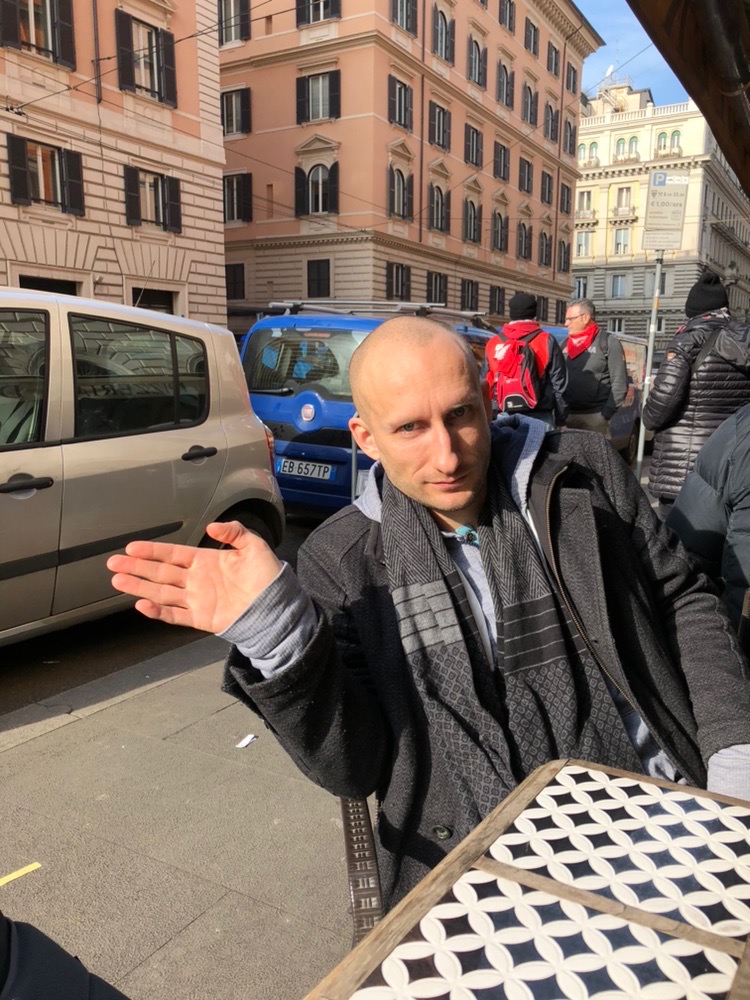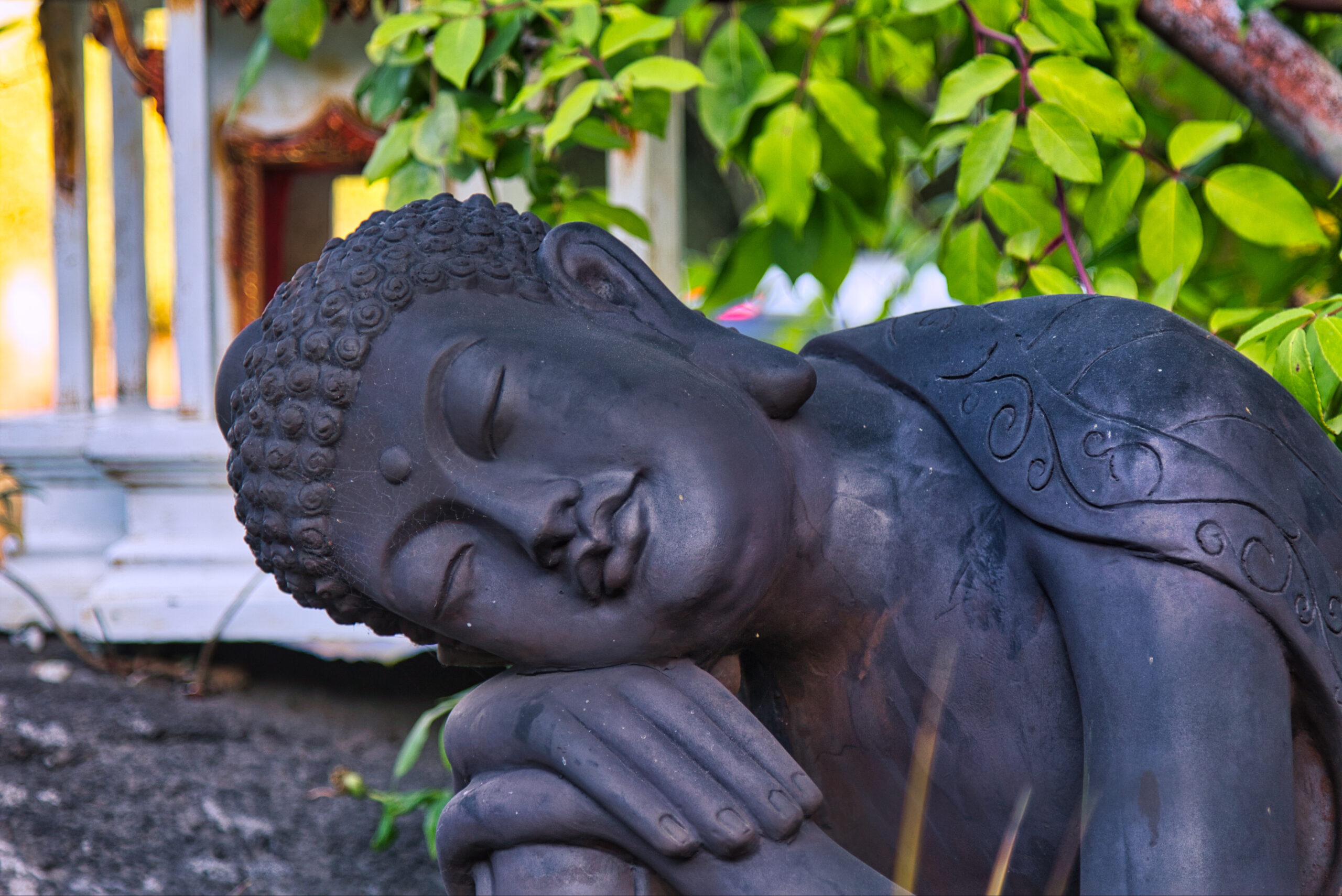
Meaning
Shipwreck without a boat - On the Meaning of Life
Cherry Blossoms
From the window at his round wooden table, he has an unobstructed view of the backyard of the ageing Stalin building. As the man eats, he keeps looking out towards the cherry tree, which is in full bloom.
After the man has finished eating, he opens the window and lets the cool air into his kitchen. Decades have passed since he noticed the once small tree in his neighborhood. The plant would survive him for decades. He reaches for his camera and takes a picture of this moment in both their lives.
When he brings the developed photo to a family celebration one day, nobody is interested in it. After his death, the picture falls into his brother’s hands as he is clearing out the small apartment. The cherry tree had long since given way to a parking garage.

On the Precipice
In Varieties of Religious Experience, William James tries to “think along” as closely as possible to people’s personal experiences. He has compiled an album of the most diverse experiences, “gluing” them together with his reflections, as it were. I would like to quote one of these experiences given there:
“Suddenly,” writes Symonds, “at church, or in company, or when I was reading, and always, I think, when my muscles were at rest, I felt the approach of the mood. Irresistibly it took possession of my mind and will, lasted what seemed an eternity, and disappeared in a series of rapid sensations which resembled the awakening from anæsthetic influence. One reason why I disliked this kind of trance was that I could not describe it to myself. I cannot even now find words to render it intelligible. It consisted in a gradual but swiftly progressive obliteration of space, time, sensation, and the multitudinous factors of experience which seem to qualify what we are pleased to call our Self. In proportion as these conditions of ordinary consciousness were subtracted, the sense of an underlying or essential consciousness acquired intensity. At last nothing remained but a pure, absolute, abstract Self. The universe became without form and void of content. But Self persisted, formidable in its vivid keenness, feeling the most poignant doubt about reality, ready, as it seemed, to find existence break as breaks a bubble round about it. And what then? The apprehension of a coming dissolution, the grim conviction that this state was the last state of the conscious Self, the sense that I had followed the last thread of being to the verge of the abyss, and had arrived at demonstration of eternal Maya or illusion, stirred or seemed to stir me up again. The return to ordinary conditions of sentient existence began by my first recovering the power of touch, and then by the gradual though rapid influx of familiar impressions and diurnal interests. At last I felt myself once more a human being; and though the riddle of what is meant by life remained unsolved, I was thankful for this return from the abyss—this deliverance from so awful an initiation into the mysteries of skepticism.
“This trance recurred with diminishing frequency until I reached the age of twenty-eight. It served to impress upon my growing nature the phantasmal unreality of all the circumstances which contribute to a merely phenomenal consciousness. Often have I asked myself with anguish, on waking from that formless state of denuded, keenly sentient being, Which is the unreality?—the trance of fiery, vacant, apprehensive, skeptical Self from which I issue, or these surrounding phenomena and habits which veil that inner Self and build a self of flesh-and-blood conventionality? Again, are men the factors of some dream, the dream-like unsubstantiality of which they comprehend at such eventful moments? What would happen if the final stage of the trance were reached?”[1]
James notes that this is a kind of pathologized description of mystical experiences. It is not a peaceful touch by the hand of God or a clarifying enlightenment. The author’s interpretative description is ambivalent. In a state of trance, the everyday and conceptualized world of sensation and experience is something unreal, even illusory. During the trance, the riddle of life seems to unravel. Nevertheless, the return to the phenomenal world apparently leaves traces of constant doubt as to which state is the actual illusion. Is the return to the ordinary world of sensation and judgment perhaps just a supposedly pleasant escape?
[1] Nach William James: The Varieties of Religious Experience, Penguin Classics, 1983, S. 385f.

Without worry
A supposedly “mystical” experience is described quite differently by the artist Kurt Barnert in the film Never Look Away.
1948 in East Germany. A gentle rustling of cornfields can be heard. Wind makes waves ripple across meadows. The budding artist Kurt Barnert sits in an oak tree, gazes into the distance of the agrarian landscape and closes his eyes for a moment. Smiling, he opens them again and suddenly breathes a sigh of relief before swinging himself out of the tree and running home across the meadows and through the fields, somewhat awkwardly like a little boy. When he arrives, his father, an unemployed teacher, is sitting at a wooden table trying his hand at repairing the inner works of a radio.
“Father, you don’t have to worry anymore, I got it! I’ve got it!” “What did you get?”, his father asks him.
“Everything, how everything is connected, everything, the Theory of Everything. I never have to worry again. I need never be afraid again. I am untouchable.”
To which the father replies: “That’s nice.”
“No father, you don’t understand! You don’t have to worry anymore either, really. And I don’t even have to become an artist. I can take up any profession and I will always find the right thing, the truth.”
“That makes me happy for you, really.”
“I have to hold on to it, somehow.”
His mother had overheard their strange conversation and approaches her husband with a worried look. He tries to reassure her because he knows what is going through her mind. She remembers Kurt’s aunt, who was first sterilized by the Nazis for alleged schizophrenia and then gassed to death because she was “unworthy of life”.
“I know who you’re thinking of, but he’s different.”
His father will not be able to reconnect with his former life as a teacher and will hang himself. At his wife’s urging, he had reluctantly joined the NSDAP so as not to be at a professional disadvantage. A step that prevented him from returning to the professional world of the GDR. Kurt Barnert himself is portrayed as a seeker. The path to his works, his own style, to a life with his love is portrayed dramatically, albeit relatively calmly.
His profound experience on the oak tree is not a permanent state. It does not radiate continuously throughout his life, does not guarantee lasting lack of worry. But perhaps it is very often effective through a memory. Perhaps it guides him or helps him make one or two course corrections. On the other hand, we are talking about a movie that tells a story. Such stories are often directed towards a goal. It is questionable whether, when we move in this space, we do not give in too much to our desire that life must lead to something or be controlled by something and thus miss out on “real life”.

The Signpost
In his Confession, Tolstoy, the great seeker of meaning and teacher of many people, does not tell us about a sudden mystical experience that revealed to him the “meaning of it all” or even led him to turn his own life around. Instead, he describes how his way of life became a torment in the face of increasingly urgent questions about the purpose of life, his way of life and his own actions. His existence threatened to collapse under the weight of these questions, and Tolstoy was on the verge of suicide. A life in the sense of the phrase of perpetual progress through technical, scientific, philosophical or some “general” so-called intellectual perfection seemed to him to be just another variant of the attempts to generate ever more sophisticated satisfaction of needs. A game that people who have become entangled in ever-increasing competition like to play: Who can manage to satisfy the most needs in the most sophisticated way. For Tolstoy, the players of this game were ultimately doomed. The “riddle of life” could not be solved in this way. But you need a solution in order to continue living at all. Just as you cannot go out to sea without knowing where you are going, you cannot live without knowing why:
“My question – the question that led me to thoughts of suicide in the fiftieth year of my life was the simplest question that rests in the soul of every human being, from the stupidest child to the wisest old man, the question without which life is impossible, as I actually experienced myself. The question is this: “What will be the result of what I do today, what I will do tomorrow – what will be the result of my whole life?”
In other words, the question will be: “What am I living for? What do I desire? What do I act for?” The question can be expressed still differently: “Is there any meaning in my life that would not be destroyed by the inevitable death that awaits me?”” (p. 46)
Schopenhauer, Solomon, Socrates, Buddha, they would all produce human wisdom as answers to the question of meaning of life. And all their answers basically boiled down to the same thing: all life is transient and so we should always keep the passing of the body and our own life in mind, perhaps even wish for it, and thus free ourselves from any possibility of this vain existence in competitive games.
In Tolstoy, however, in addition to this form of reasoning about finiteness suggested and exemplified by the sages, something else was at work: he became aware of the countless people who did not lead an elitist spiritual life of despair or wisdom, but who lived simply and contentedly and almost thoughtlessly. To believe that Solomon or Schopenhauer had lived the real life, but that everyone else existed in delusion, was a great mistake. Tolstoy resolved to overcome this arrogance and asked himself what meaning the so-called simple people gave to their lives.
Tolstoy remarked that the question of the meaning of life had been wrongly posed. He had mistakenly tried to explain the infinite into the finite and vice versa. Life is finite. People despair of this and try to find an “extra-finite” meaning with help of their reason. However, this thinking and searching must in turn break the human mind.
The answer to the question of meaning, to the question of how we should live, is given only by faith, when it refers us to God’s law. “What indestructible thing will come out of my life?” Faith answers this question: eternal torment or eternal bliss. “What is the meaning of life?”: Union with the infinite God, paradise. This unreasonable kind of knowledge, the knowledge of faith, lies within every human being and only it can answer the question of life. Faith alone gives finite existence an infinite meaning that is not negated by death and suffering.
This meaning can be seen in the practical application of the simple, working people, but not in the parasitic thinking elite, according to Tolstoy. The sage is in the sense of these elites, the one who sees suffering and death as evil. Those simple people, however, usually lived and suffered as they saw fit and approached death in peace, often even in joy. Dying in unrest was rather the exception among them.
I have my doubts about this assessment of Tolstoy. What he is getting at is nevertheless worth noting. Due to the disappointment of not being able to change his life for the better intellectually alone, he criticizes all attempts to penetrate life thoughtfully and to expect an answer to the question of meaning from scientific or metaphysical insights. But only through life itself can its meaning be found, according to Tolstoy. Although the change in his own form of life is driven by a feeling, he repeatedly emphasizes that “the irony” lies precisely in the process of change, not in a fixed concept, a flash of an idea or a substantially understood feeling, through which everything that happens to you can be “reduced to a denominator”: the meaning of it all. Therefore, the doctrine of faith, to which he subscribed, had to be tested in the act of living itself and not in conceptual analysis. Knowledge of faith, as Tolstoy understands it, is a knowledge of its own kind, which arises precisely in the course of life and not in its contemplation. It is not possible to find an explanation or a principle of the meaning of life theoretically.
“The signpost is all right – if it fulfills its purpose under normal circumstances.
If I say to someone […]: “Stay right here! – Can’t this explanation work perfectly? (And can’t every other one also fail?)”” (Wittgenstein, Ludwig: Nachlass 220 64, The Bergen Electronic Edition, Charlottesville, Virginia, USA: InteLex Corporation, 2003)

Eating, Shitting, Dying
Some time ago, Michael Hampe drew my attention to a YouTube video that has been on my mind ever since. I would like to briefly reproduce what you can see and hear there. The Buddhist nun Guja talks about a poem that she likes. It says that we come into the world to eat, sleep and shit and in the end there is only one thing left: to die. She likes the poem very much, it gives her pleasure.
I think the poem pokes fun at the “why” question that we often seem to ask ourselves. Guja mentions a few other everyday things that everyone can think of for themselves, such as television and sex. The poem should not be understood in a pessimistic way. But if you are looking for more, if you believe that life should be about more, e.g. Zen, Buddhism, emptiness, enlightenment, clarity, … then you have a problem.
In Zen, Guja continues, they don’t teach you how to live well or how to be good. They don’t teach about life and death, but about going beyond both. You shouldn’t think it’s about something higher up or something lower down, there’s nothing there. But there is in eating, in sleeping, in shitting. The question is: How do you do all this? It’s not about the object of your actions, or about what comes in or out of you. What she is talking about is: What is it that does all this? You have to find that and then there is neither life nor death.

Aiming High
Farner writes for all those seeking meaning, especially in a time of cultural change. He wants to provide a tangible world view in response to what he sees as the primal question of philosophy: where from, where to and what for.
The crisis-ridden times in which he lived, in which old value systems no longer held people together and no longer offered any orientation in life, brought the question of meaning all the more pressing. Such crises made it clear that all materialism, nihilism and the denial of meaning in general were merely adolescent reactions of defiance or despair, i.e. signs of immaturity. These ways of thinking are products of material, i.e. external security, which creates the illusion of the denial of the meaning of life. But it is precisely the difficult times, characterized by burden and deprivation, that make it all the more clear how important it is to reflect on inner stability. Pursuing the sense of meaning that every person feels and demanding a positive response, on the other hand, is the sign of a more mature spirit, because the more mature a person is, the more they want to see themselves integrated into the larger context of life.
Farner sees himself as an advocate for those people who are looking for a temporal, fulfillable desire for meaning in the finiteness of life, not just an object of faith.
In everyday life, he says, our actions are directed towards ends, such as the family or the homeland. But these things cannot constitute the meaning of life, because they are finite things, changeable in space and time. Limiting ourselves to finite purposes alone would completely prevent the spiritual development of human beings. For: “Meaning is the higher thing, independent of the limitations of space and time.” (Farner, G. A.: Über den Sinn des Lebens, Zürich: Wegweiserverlag, 1938 P. 234. p. 234 Trsl. by MM) Meaning is enthroned above all purposes and is immutable:
“There is only one meaning of life, the eternal, infinite meaning of a development leading to absolute perfection. As a finite meaning, this meaning is a tiny fragment of the infinite whole of meaning and can be fulfilled in human existence. The finite sense is fulfilled with the attainment of the finite possibilities of development.” (Ibid, p.234. Trsl. by MM)

Delusions of Grandeur
Tolstoy and Farner cannot quite stop the production of concepts, despite their own assessment. In the end, they do not seem to be able to permanently calm their urge to grasp the unspeakable in language and thus make it comprehensible. On the other hand, two things must be distinguished here. The mystical experience we were talking about never seems to be permanent. It arises and ends again. How far and to what extent it intervenes in life is neither always the same nor easy to fix. I suspect that such experiences are interpreted and used very differently depending on life history, educational background, mind, etc. Perhaps it has something to do with becoming wiser when we accept that there is simply no such thing as an ultimate program update for us, which perfects us existentially or morally and allows us to wander through life without a care in the world.
Mystical experiences and the question of meaning are not “innocent per se”. William James writes about these experiences that they often give the bearer the impression of a revelation or unveiling of a knowledge of the world that, although speechless, is nevertheless profound, with an authority and power that is hard to find elsewhere. The question of the meaning of the world and of life and attempts to answer it operate with delicate, highly vulnerable parts of our souls. An explosive mixture.

Long Live Everyday Life
I am no longer looking for anything beside, behind or above the everyday things in life, no extraordinary object or extraordinary action. Because the ordinary is fine in itself and needs no improvement? Has the meaning of it all emerged without anything in the world having to change?
Wittgenstein is sometimes understood as if he saw everyday language, and that means the practices of everyday life, as a kind of savior of reflection and judge of all meaning. As if everyday life itself were not often fraught with problems.
What is less noticeable is that there can be a benefit in refraining from actions and reflections. We usually only think about our inclinations to start, to initiate, to build, to finish something, etc. Something gets in the way or fails. We then look for a “trick” that removes this “resistance” and don’t pay attention to the fact that the resistance only exists relative to our projects. If we hadn’t started the projects, the resistance wouldn’t be there either. Every conceptual intervention in our lives can also have unforeseeable consequences. In philosophical reflection, the conceptual shift initially thought of as a solution to a problem quickly leads to new constraints and apparent necessities of thought. The philosopher Rainer Specht once called this “innovation and consequence”. The difficulty lies in being able to distance oneself from a certain programmatic way of thinking that says: “So, let’s start all over again with life and knowledge and let’s do it right, with all precision and certainty!” In his later philosophy, Wittgenstein, when he argues against such programs, does not advocate remaining in the fog of vagueness and simply continuing with all the crap you have started. On the contrary, he even says that the clarity he is striving for is a perfect one. (Wittgenstein, Ludwig: Nachlass 238 17f. 64, The Bergen Electronic Edition, Charlottesville, Virginia, USA: InteLex Corporation, 2003) However, he is concerned with a clarity of mind in which it becomes possible to stop philosophizing whenever one wants to. He philosophizes this attitude, gives examples, strings them together in chains and breaks them off again. He doesn’t want to trap his readers in a system, his own favorite thoughts or even keep the unfulfillable promise that he has found the solution to all problems through a certain movement of thought. What he has in mind is rather a gain in freedom of thought and action, which is also not compatible with a fetishization of the everyday and a canonization of the traditional, which some would like to put in the place of systems of thought and dogmas of faith.
